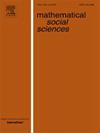A new value for cooperative games on intersection-closed systems
IF 0.7
4区 经济学
Q4 ECONOMICS
引用次数: 0
Abstract
In the model of cooperative games with restricted cooperation, certain coalitions are infeasible, meaning they cannot form, which directly influences payoff allocation. We consider a scenario where coalitions are no longer categorized as feasible or infeasible, but rather as known or unknown. In this setting, coalitions with unknown values are still feasible, but their values remain unknown in the allocation process. Classical allocation methods for games with restricted cooperation, such as the R-value, become unsuitable for such scenarios.
We introduce a new allocation rule called the uniform-dividend value (UD-value), designed specifically for cooperative games where some coalition values remain unknown (so-called incomplete cooperative games). The UD-value allocates payoffs by evenly distributing the total surplus within each group of indistinguishable coalitions. We demonstrate that for intersection-closed set systems, the UD-value is uniquely determined and can also be viewed as the expected Shapley value computed over all totally positive (i.e., nonnegative-surplus) extensions of the incomplete cooperative game. We compare the UD-value to two existing allocation rules for intersection-closed games: the R-value, defined as the Shapley value of a game that sets surplus of absent coalition values to zero, and the IC-value, tailored specifically for intersection-closed systems. Specifically, we provide axiomatic characterizations of the UD-value motivated by characterizations of the IC-value and discuss further properties such as fairness and balanced contributions.
交闭系统上合作对策的一个新值
在限制合作的合作博弈模型中,某些联盟是不可行的,即无法形成,这直接影响到收益分配。我们考虑这样一种情况,即联盟不再被划分为可行或不可行,而是已知或未知。在这种情况下,具有未知值的联盟仍然是可行的,但其值在分配过程中仍然是未知的。限制合作博弈的经典分配方法(如r值)不适合这种情况。我们引入了一种新的分配规则,称为一致红利值(UD-value),专门设计用于一些联盟值仍然未知的合作博弈(所谓的不完全合作博弈)。美元价值通过在每组不可区分的联盟中平均分配总盈余来分配收益。我们证明了对于相交闭集系统,ud值是唯一确定的,并且可以看作是在不完全合作对策的所有全正(即非负剩余)扩展上计算的期望Shapley值。我们将ud值与两个现有的交叉口封闭博弈分配规则进行比较:r值,定义为将缺席联盟值的盈余设置为零的博弈的Shapley值,以及ic值,专门为交叉口封闭系统量身定制。具体来说,我们提供了由ic值特征驱动的ud值的公理化特征,并进一步讨论了公平性和平衡贡献等性质。
本文章由计算机程序翻译,如有差异,请以英文原文为准。
求助全文
约1分钟内获得全文
求助全文
来源期刊

Mathematical Social Sciences
数学-数学跨学科应用
CiteScore
1.30
自引率
0.00%
发文量
55
审稿时长
59 days
期刊介绍:
The international, interdisciplinary journal Mathematical Social Sciences publishes original research articles, survey papers, short notes and book reviews. The journal emphasizes the unity of mathematical modelling in economics, psychology, political sciences, sociology and other social sciences.
Topics of particular interest include the fundamental aspects of choice, information, and preferences (decision science) and of interaction (game theory and economic theory), the measurement of utility, welfare and inequality, the formal theories of justice and implementation, voting rules, cooperative games, fair division, cost allocation, bargaining, matching, social networks, and evolutionary and other dynamics models.
Papers published by the journal are mathematically rigorous but no bounds, from above or from below, limits their technical level. All mathematical techniques may be used. The articles should be self-contained and readable by social scientists trained in mathematics.
 求助内容:
求助内容: 应助结果提醒方式:
应助结果提醒方式:


